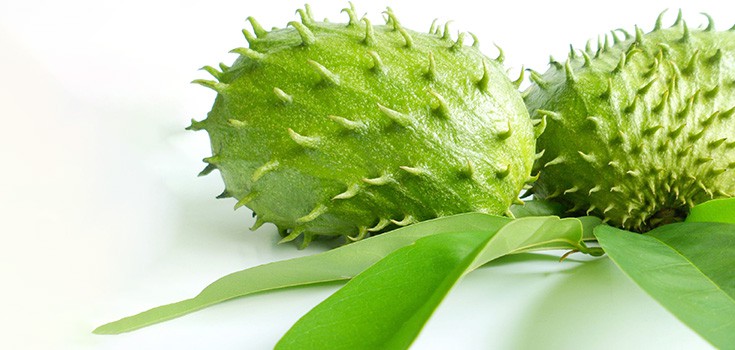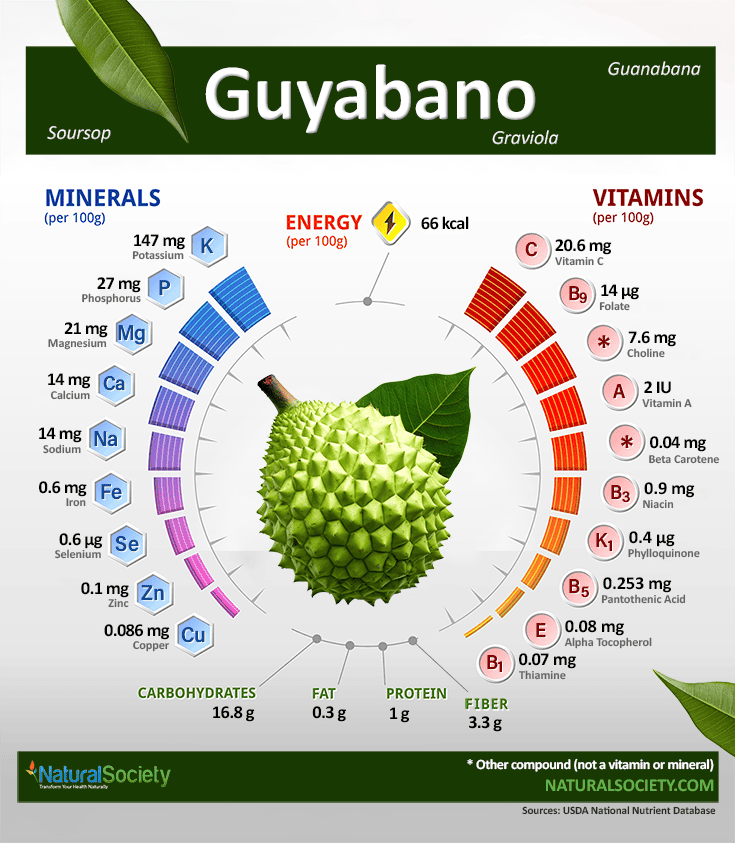Guyabano Benefits – Revealing 15+ Medicinal Properties of an Exotic Fruit

Want to expand your mind with knowledge of a fruit you probably never knew existed? The tropical fruit, guyabano (also known as soursop and guanabana) offers a treasure trove of benefits. From fighting cancer to improving eye health, here you will learn of 15+ guyabano benefits you can enjoy.
Read below to discover how this under-the-radar exotic superfood can bring newfound happiness to both your body and taste buds!
What is Guyabano?
Guyabano is a fruit that comes from the Graviola tree. Other names for guyabano include guanábana (Spanish, known in the Philippines), graviola (Portuguese), pawpaw (in Brazil), corossol (French), soursop (English), and custard apple (English). The scientific name is annona muricata.
The graviola tree grows in warm tropical areas such as the Philippines and South America. Known as a sedative, a nerve tonic, and used to maintain proper intestinal health, the guyabano fruit is just one medicinal tool stemming from the graviola tree.
Throughout history, each part of the graviola tree, such as the seeds, bark, leaves, roots, fruit, and bark has been used for medicinal purposes. The seeds have been used to treat nausea and vomiting, while herbal medicine practitioners recommend using the fruit and leaves to relieve stomach distress, pain, cough, asthma, and fever.
Guyabano Nutrition
Guyabano is most rich in potassium, phosphorus, magnesium, vitamin C, and B vitamins folate (B9) and niacin (B3).

Mega-Review Outlines 9+ Guyabano Benefits You Can Experience Today
Guanabana (the name known in the Philippines) offers a multitude of potential benefits, including its ability to fight cancer, improve eye health, help combat inflammation, fight infections, aid in diabetes treatment, boost kidney and liver health, improve respiratory health, relieve stress, enhance gastrointestinal health, and boost the immune system.
Widely used globally as a traditional medicine for many diseases, guyabano (Annona muricata) is a plant belonging to the Annonaceae family. One mega review analyzing 49 research articles on A. muricata showcases the following overall protective properties of guanabana:
- 1. Anticancer (25%)
- 2. Antiulcer (17%)
- 3. Antidiabetic (14%)
- 4. Antiprotozoal (10%)
- 5. Antidiarrhea (8%)
- 6. Antibacterial (8%)
- 7. Antiviral (8%)
- 8. Antihypertensive (6%)
- 9. Wound healing (4%)
A. muricata contains compounds such as acetogenins (annomuricins and annonacin), alkaloids (coreximine and reticuline), flavonoids (quercetin), and several essential vitamins which said to be responsible for the benefits offered.
Keep reading to further discover the health benefits of guyabano and how all parts of the graviola tree can boost your health.
1. Guyabano Benefits for Cancer
Since 1976, at least 20 independent labs researched guyabano’s anti-cancer effects following initial research carried out by the National Cancer Institute. The National Cancer Institute found that guyabano’s “leaves and stems were found effective in attacking and destroying malignant cells.”
After the 1976 findings, other research studies came out with similar conclusions:
- One study published in the Journal of Natural Products found that one chemical in Graviola was 10,000 times more potent than a chemotherapy drug called Adriamycin.
- Purdue University found that leaves from the guyabano tree “killed cancer cells among six human cell lines.” The researchers also found that the leaves were particularly effective for prostate and pancreatic cancers.
One piece of research found on PubMed concluded:
“Overall, the compounds that are naturally present in a Graviola extract inhibited multiple signaling pathways that regulate metabolism, cell cycle, survival, and metastatic properties in PC cells. Collectively, alterations in these parameters led to a decrease in tumorigenicity and metastasis of orthotopically implanted pancreatic tumors, indicating promising characteristics of the natural product against this lethal disease.”
Another study delves into potential guyabano leaves benefits in treating cervical cancer, a significant cause of female mortality globally. The research aimed to explore the anticancer properties of endophytic fungi extracted from soursop leaves.
The findings revealed that the extracts exhibited cytotoxicity against cervical cancer cells, particularly inhibiting the growth of HeLa cancer cells in vitro. One specific endophytic fungi extract, named Sir-SM2, demonstrated high cytotoxicity towards cervical cancer cells while being less detrimental to normal Chang cells, suggesting its potential as a natural anticancer agent.
Further showcasing soursop’s ability to kill cancer cells, more research reveals how the bioactive compounds can inhibit the growth and proliferation of breast cancer cells. Specifically, the acetogenins present in soursop have shown promise in targeting and killing malignant cells without harming healthy cells. This selective cytotoxicity makes soursop a potential natural remedy in the fight against breast cancer.
For further protection, combine soursop with other cancer-fighting foods such as berries, green tea, and cruciferous vegetables like broccoli and cauliflower. A great addition to a healthy diet, these foods are rich in antioxidants, vitamins, and minerals that can help strengthen the body’s immune system and support overall health.
2. Regulate Blood Pressure
Studies have indicated that the fruit extracts of A. muricata possess both antioxidant and antihypertensive qualities, acting on angiotensin-I-converting enzymes in a lab setting.
Additionally, the leaf extract of A. muricata demonstrated antihypertensive effects in standard-condition rats. The believed mechanism behind A. muricata’s blood pressure-lowering effect is its ability to obstruct calcium ion channels, subsequently reducing blood pressure.
Furthermore, research has found that the water-based soursop extract, especially when combined with plants like Persea americana, offers antihypertensive benefits, further helping to lower high blood pressure.
3. Treat Infections
The bioactive compounds present in soursop have demonstrated the ability to inhibit the growth and proliferation of certain bacterial strains, offering a natural alternative to traditional antibiotics.
Other research shows ethanolic extract and antibiotic treatment decreased the potential of antibiotic multidrug-resistant E. coli and Staphylococcus aureus strains. The bioactive compounds, such as alkaloids (annonaine, asimilobine, liriodenine, nornuciferine, etc.), attack the bacterial membrane, resulting in broad-spectrum antibacterial activity.
This makes soursop a promising candidate for the development of new antibacterial agents, especially in an era where antibiotic resistance is a growing concern.
4. Boost Your Immune System
Soursop contains high levels of vitamin C, which is known for its potential to bolster the immune system by supporting its functions and helping it fight off infections and illnesses.
In addition, soursop is rich in antioxidants that protect the immune system from harmful free radicals. These antioxidants help keep your cells healthy and ensure the proper functioning of your immune system.
5. Help with Inflammation and Pain Relief
If you’re looking for a natural remedy to ease inflammation and find relief from pain, adding soursop leaves to your routine could be beneficial. Soursop leaves have powerful antioxidants that can reduce inflammation in the body and provide relief from pain.
Guanabana has been traditionally utilized in African medicine for the alleviation of neuralgia, rheumatism, and arthritic pain. Research indicates that the anti-inflammatory property of the soursop extract may be attributed to the inhibition of chemical mediators responsible for inflammation.
Furthermore, the extract showed a significant reduction in cyclooxygenase (COX)-1 and COX-2 activity, which are enzymes involved in the inflammatory process.
Guyabano’s Other Health Benefits:
- 6. Aids Diabetes Treatment – Soursop fruit extracts were reported to exert antioxidant and antidiabetic effects by inhibiting key enzymes relevant to type 2 diabetes. The seed oil also showed potential antidiabetic activity against type 1 diabetes induced by streptozotocin.
- 7. Boosts Kidney and Liver Health – Antioxidants present in soursop, such as vitamins C and E, can aid in improving the functioning of the kidney and liver, contributing to overall improvement in renal and hepatic health. Additionally, soursop’s anti-inflammatory effects may help reduce inflammation in the kidneys and liver. Its high-fiber content also plays a role in detoxification processes for these organs.
- 8. Reduced Stress and Better Sleep – Drinking tea made from guyabano leaves can help improve your sleep and provide better rest. Guyabano leaves have calming properties that can relax your body and mind, making it easier for you to fall asleep and stay asleep throughout the night. This herbal tea stimulates the release of serotonin, a neurotransmitter that promotes mood stabilization, happiness, relaxation, and overall wellness. So, after a stressful day, enjoying a cup of guyabano leaf tea can calm your body and mind, leading to improved sleep quality.
- 9. Improved Respiratory Health – Soursop is not just a delicious tropical fruit, it also has amazing benefits for your respiratory health. Natural compounds found in the leaves of the soursop tree have been found to be effective in reducing symptoms of respiratory conditions like asthma.
- 10. Better Digestive Health – Soursop is a fruit that can work wonders for your gastrointestinal health. It promotes gut health and improves the overall function of your digestive system. One of the reasons soursop is beneficial for digestion is because it contains dietary fiber, which helps regulate bowel movements and supports a healthy gut microbiome. High fiber foods help with constipation as well.
Other Specific Nutrient-Based Health Benefits of Guyabano
- 11. Prevents urinary tract infections – Guyabano is known for its vitamin C content (77% daily value per cup). Vitamin C can help to decrease the amount of harmful bacteria that may be present in the urinary tract.
- 12. May help with anemia – Soursop (guyabano) is rich in iron, which could help with iron deficiency anemia.
- 13. Prevents constipation – Being rich in fiber, guyabano is one of the many foods that can help with constipation.
- 14. Bone health – Guyabano contains copper, a mineral promoting the absorption of bone-benefiting calcium.
- 15. Prevents leg cramps – Potassium in the fruit could help prevent leg cramps.
- 16. Boosts energy levels – Along with vitamin C, the B vitamins in guyabano are known to help increase energy levels.
Guyabano Benefit Summary – Guyabano can Used for:
- Cancer
- Infections, such as UTI’s
- Diabetes
- Digestive health, intestinal upset, constipation, and stomach distress
- Blood pressure regulation
- Wounds
- Inflammation
- Respiratory issues such as asthma or cough
- Pain
- Bone health
- Fever
- Cramps
- Bone health
- Iron deficiency anemia
- Lack of energy
- Overall immune support
How to Consume Soursop
Here are some different ways to consume soursop fruit:
- Eat the ripe soursop fruit fresh and raw.
- Blend the soursop fruit into a smoothie or juice.
- Make soursop ice cream or sorbet using the pulp of the fruit.
- Use soursop in desserts like pies, cakes, and puddings.
- Add diced soursop to fruit salads for a refreshing twist.
With its rich nutritional content and versatile nature, incorporating soursop into your diet can be a great way to support overall well-being. It’s time to enjoy all of the incredible benefits of this remarkable fruit!
Remember to consult a healthcare professional before embarking on your self-healing journey.
Additional Sources:
